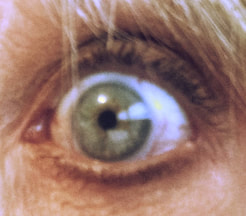
Are fluctuating hearing and vision
or the onset of cataracts
just an Inevitable signs of aging,
or can mercury be a factor?
When mercury affects your vision, eyes can be stressed with fluctuations and floaters. These fluctuations can be extreme or mild. It is not uncommon for vision to demand glasses one day and see perfectly the next.
I believe fluctuations have to do with the levels of toxicity that are moving through the bloodstream at any particular moment. Personally, I can tell when I am detoxing and have metals activity in my body. As the bloodstream gets clearer, symptoms lessen. That means that during a constant routine of detoxing and clearing, things can change often.
It was not until late in my years of detoxing mercury that I discovered the connection between mercury and cataracts. Apparently it is common, yet it is rare that you will hear of the connection from a medical professional.
If you have a mouth with silver amalgam fillings, you are storing mercury in your head and it seems obvious that eyes and ears can easily be affected. The fact that mercury can be delivered via contact lens solution, nose drops, anti-aging products, skin lightening products and vaccines makes the possibility of eye and ear issues much more probably.
Of course there are many reasons for cataracts, but mercury should be a suspect. Don't expect your doctor to question you about the metal in your mouth, fish consumption or any potential problems with metals poisoning as It is not on the radar of traditional medicine.
With that said, having any corrective eye surgery should wait until you are sure your problem is not connected to heavy metals. If you have amalgam fillings, I would say to have them removed before ever attempting to correct your vision through surgery.
Before my own cataract surgery, I knew that my sight varied while detoxing. I explained this to three eye surgeons, without being asked any further questions. The remedy from the first surgeon was that the "routine" cataract surgery, which meant "popping out" the clouded lens and replacing it with a plastic lens, could be repeated. When my eyes failed me, the doc said we would just replace the lens again and again.
There was no point explaining that these fluctuations can be weekly or monthly depending on conditions in the body. The doctor never asked if I was clear of toxicity or still detoxing. He didn’t need any more information before offering to operate repeatedly.
This is where my research began. I found that castor oil could help clear the lens and began using it in sterile conditions. The progress was fast and although not perfect, as my lens was fairly clouded, it did provide time to extend surgery for 8 months which allowed more investigation.
A bit of research revealed a number of things I did not know about mercury and the eyes:
1. Mercury can be a component in eye drops, medications and eye cosmetics.
2. FDA has allowed eye cosmetics to contain mercury at 65 parts per million since 2007.
2. There are many nutrients that can support eyes during poisoning.
3. Castor oil can be used directly in the eye and will help clear the clouded lens.
4. Detoxing the eyes with castor oil can remove or lessen the efects of floaters.
5. Research will show you many other natural options to support eye health
and detoxification.
Reading labels and talking with pharmacists will help to keep mercury products out of your body. Other names for mercury when used in products, include:
Hg
Mercury
Merthiolate
Merc Sol
Quicksilver
Black Oxide of Mercury
Ammonio—Nitrate of Mercury
Mercurous Chloride
Mercuric
Mercurio
Mercuric Iodide
Ammoniated Mercury
Amide Chloride of Mercury
Ethyl (2-MERCAPTOBENZOATO-S) Mercury
Sodium Salt
Sodium Ethylmercurithisosalicylate
Sodium Salt Ethyl (2-MERCAPTOBENZOATO-S) Mercury
Thiomersal
Thimersol
Ethyl (SODIUM O-MERCAPTOBENZOATO) Mercury
Ethyl (2-MERCAPTOBENZOATO-S) Mercury Sodium Salt
Ethylmercurithiosalicylic Acid Sodium Salt
Ethylmerkurithiosalicilan Sodny (Czech)
PMA, phenyl mercuric acetate
PMN, phenyl mercuric nitrate
 RSS Feed
RSS Feed